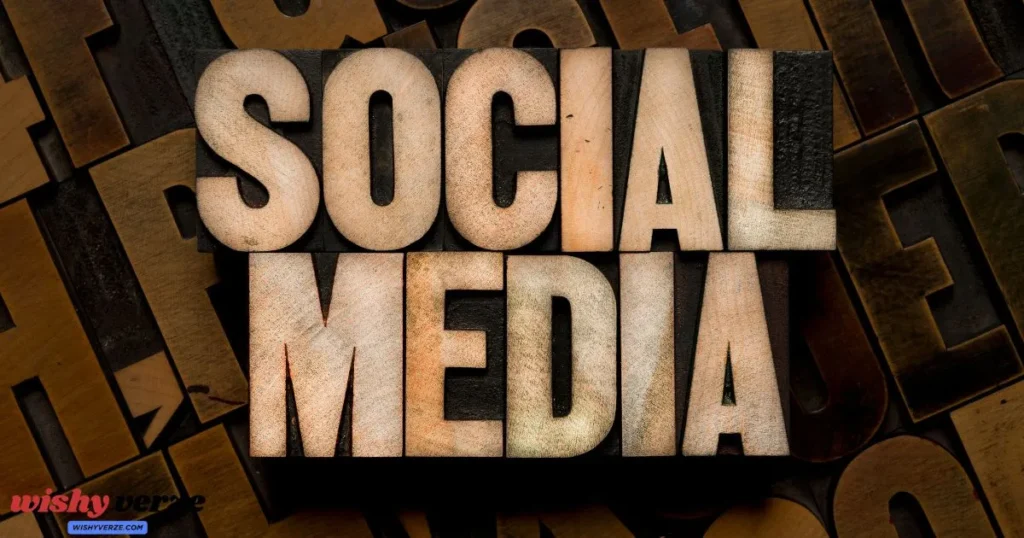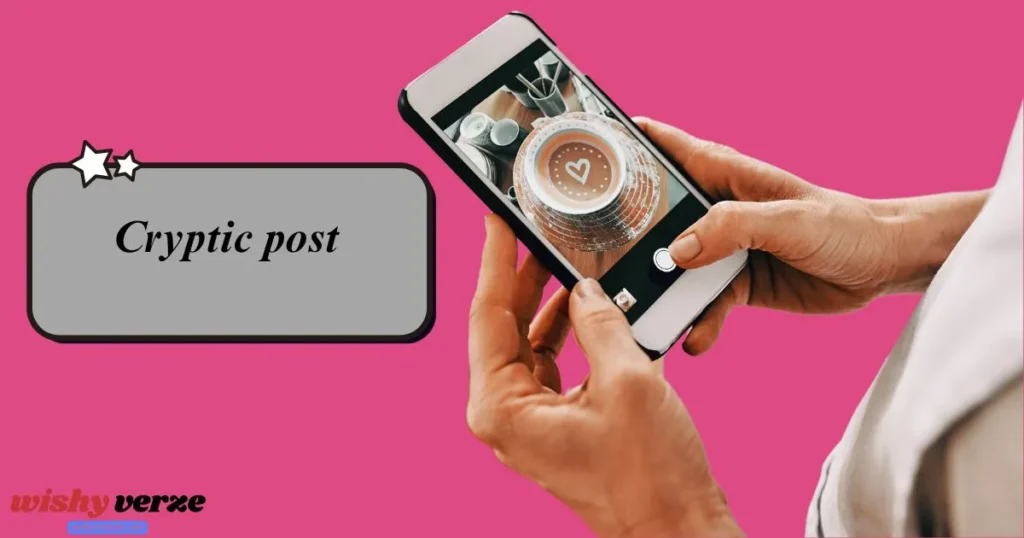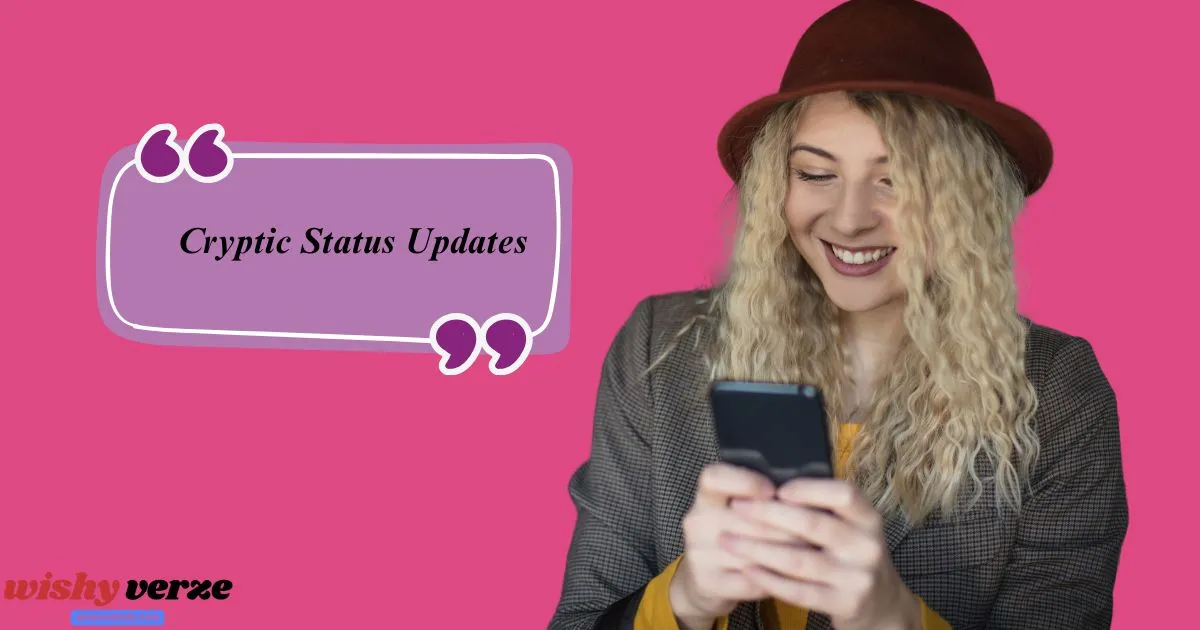“Is that cryptic post about you? Let’s decode it.”
Cryptic status updates are often intriguing, leaving us to wonder whether they hold a hidden message specifically for us. Whether it’s a vague Facebook post or a cryptic tweet, these kinds of updates can stir up feelings of curiosity, confusion, or even anxiety.
With social media being a platform where people share their thoughts, emotions, and sometimes their frustrations, it’s no surprise that these posts can lead to self-doubt or overthinking. But how can you be sure if the post is really directed at you or just a random thought?
Before you jump to conclusions, it’s important to pause and reflect. Is that post about you, or are you overanalyzing? This blog will help you decode these cryptic messages with a clear and logical approach.
“Instead of letting your emotions take over, tackle these status updates and understand the signs before they take control of your mind.”
Cryptic status updates come in many forms—vague statements, indirect hints, or passive-aggressive remarks. But how can you tell if these messages are meant for you? This article breaks down key signs that will help you assess the intent behind those puzzling posts.
From recognizing common patterns to evaluating your recent interactions with the person, we will explore the clues that point toward whether the status update is a subtle reference to you or just a coincidence. We’ll also highlight when it’s better to ignore these updates and when it’s worth addressing them directly.
The Allure of Ambiguity
People love to be mysterious on social media, and ambiguity is a powerful tool. A cryptic post leaves others wondering what’s really meant, giving the poster a sense of intrigue. For the person who posts, it might not even be about anyone specific—they could be sharing their mood or thoughts without a particular target.

However, when we see these posts, we naturally try to find connections. Is it about me? This allure of mystery often drives us to overanalyze and read between the lines, sometimes leading to unnecessary worry.
Fishing for Sympathy (Without Getting Your Hands Wet)
A cryptic post can sometimes be a way of fishing for sympathy. Someone might post something vague like, “Some days are just harder than others,” without directly asking for help. This is a passive way of signaling for attention and support, without explicitly requesting it.
If you’re the type to care about others, you may immediately feel like you should reach out, but remember, not all posts need a response, especially if they aren’t about you.
The Passive-Aggressive Power Play
Cryptic status updates often carry a hint of passive-aggressive behavior. This might be especially true if there’s been tension in your relationship with the person posting. For example, if someone posts something like, “Some people never learn,” it might be a dig at someone they’ve had a conflict with.
While it’s easy to think it’s about you, the ambiguity is the key—leaving you in a constant state of questioning. In these situations, the post is less about providing information and more about creating a power play.
Is It Really About You? The Evidence
Before jumping to conclusions, it’s essential to look at the evidence. Ask yourself: Have you recently interacted with the person? Was there a disagreement or emotional exchange? If the answer is yes, it’s more likely that the cryptic post is about you.
However, if there’s no connection, it’s probably just a general post. People often post vague updates about their feelings without intending to call anyone out.
Flirty Responses to Surprises You Didn’t See Coming
The Timing Is Suspicious
Timing is everything when it comes to deciphering cryptic posts. If someone posts something right after a conversation with you or after an argument, it’s natural to think it’s about you. The coincidence of timing makes it hard to ignore. However, timing alone doesn’t necessarily mean that the post is about you—it could just be an unrelated thought at the wrong time.
It Echoes Your Recent Conversation
If the cryptic post closely mirrors a conversation you had with the person recently, then you may have reason to be concerned. For instance, if you discuss a sensitive topic with them and they soon post something like, “Some people just don’t understand,” you might wonder if they direct it at you.
However, remember that many people express their frustrations through indirect posts, and it may not always be about you specifically.
The Language Feels Familiar
The choice of words in a cryptic post can reveal a lot about the author’s intentions. If you’ve had past conversations where specific phrases or terms were used, and those same words appear in the post, it could be a sign that the post is about you.
People often have personal ways of communicating, and these linguistic habits might be subconsciously revealed in their posts.
Your Mutual Friends Are Reacting
Sometimes the reactions of mutual friends can give you a clue about the intent behind a cryptic post. If mutual friends like or comment on a vague post, you might wonder if they’re aware of the deeper meaning. If you’re uncertain, you can observe how others interpret the post. If they seem to understand it’s about you, it might be time to address it directly.
When It’s Probably Not About You
There are many situations where a cryptic post might have nothing to do with you. The person could just be expressing their own frustrations, thoughts, or emotions without targeting anyone.
People often share personal struggles or reflect on life in a way that others might misinterpret as a personal message. If there’s no direct connection, it’s likely not about you.
The Poster Is a Serial Vaguebooker
Some people are serial vague posters. They often post cryptic, unclear updates regularly, making it harder to pinpoint any specific target. If this person is known for posting ambiguous content, it’s important to step back and realize that not every post is meant to send a personal message.
You Haven’t Interacted Recently
If you haven’t had any recent interactions with the person, it’s less likely that their post is about you. Cryptic updates are more common after an interaction or event that stirs emotions. If there’s been a lack of communication, it’s safe to assume that the post is unrelated to you.
The Post Is Way Off Base
Sometimes, cryptic posts can be completely unrelated to anything personal. The message might feel off-base or unrelated to your life, clearly indicating that it’s not intended for you.
The Dangers of Over Analyzing
Overanalyzing cryptic posts can take up your precious time and energy. The more you try to decode these ambiguous messages, the more power you give to the poster. Instead of focusing on whether the post is about you, it’s healthier to avoid excessive speculation. Consider the possibility that it might not even be personal at all.
You’re Giving Them Too Much Power
When you let cryptic posts consume your thoughts, you’re giving the poster unnecessary power over your emotions. The best way to handle these situations is to keep your peace and not let vague social media updates control your mindset. Responding or reacting impulsively only adds to the drama.
It’s a Waste of Your Precious Time
Spending too much time worrying about the intent behind a cryptic post is a waste of your energy. You could be focusing on more important aspects of your life, rather than engaging in unnecessary drama. Don’t let cryptic updates steal your time and peace of mind.
You Might Be Creating Drama Where There Is None
Sometimes, the drama is all in your head. If there’s no real evidence to suggest that the cryptic post is about you, it’s possible that you’re creating unnecessary conflict. In such cases, the best approach is to ignore the post and focus on your life.

How to Respond (Or Not)
Dealing with cryptic posts can be tricky. Sometimes it’s best to let it go and move on. However, if you feel that the post is indeed about you, consider responding calmly and directly. In some cases, the high road is the best path, avoiding unnecessary confrontations.
The Direct Approach
If the cryptic post really bothers you and you suspect it’s about you, consider taking the direct approach. “Contact the person and ask if they meant their post for you.”
The High Road
If you feel the post is targeting you, but you prefer not to engage, taking the high road is a wise decision. Ignore the post, focus on yourself, and let the situation pass. Often, people post cryptic updates out of frustration, and engaging with them only fuels the fire.
The Taste of Their Own Medicine
If you’re in the mood for a little playful revenge, consider posting a cryptic update of your own. Use vague language to send a message without directly addressing the person. Sometimes, giving them a taste of their own medicine can provide a sense of closure.
Key Insight
1. How can I tell if a cryptic post is about me?
Look for patterns in timing, recent interactions, or if the language used feels familiar. However, sometimes these posts are just general thoughts and may not be directed at you.
2. Should I respond to a cryptic status update?
It depends. If you feel it’s directed at you, consider addressing it calmly and directly. However, if it’s vague and unrelated, it’s often better to ignore it.
3. Can cryptic posts be a form of passive-aggressive behavior?
Yes, cryptic posts often have a passive-aggressive tone. They can be a way of expressing frustration without directly confronting someone.
4. How can I avoid overanalyzing cryptic posts?
Focus on the bigger picture and avoid jumping to conclusions. Often, cryptic posts are not personal and might just reflect the poster’s emotions.
5. Is it okay to post cryptic updates myself?
While it’s common for people to express themselves cryptically, it’s important to consider how your posts might be interpreted. If you want to communicate something specific, direct communication is always best.
Final Take
Cryptic status updates often create confusion, leaving us questioning their true intent. Whether someone means them for us or not, we should approach these posts with a clear mind and not let them take over our emotions.
By recognizing the signs, timing, and patterns behind these updates, we can navigate social media without unnecessary drama.
Instead of over analyzing, focus on what’s important in your life, and don’t let vague posts control your mental state. Stay calm, stay focused, and remember, not everything posted online is meant for you.

Hi! I’m Zadie Smith, a word enthusiast at WishyVerze, where I curate heartfelt quotes, wishes, and clever puns to brighten your day.












